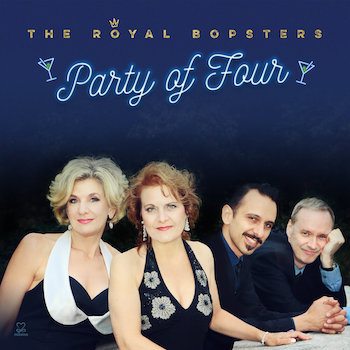Jazz Album Review: The Royal Bopsters — A Polished “Party of Four”
By Steve Provizer
This recording displays a mastery of the techniques of the jazz vocal group genre.
The Royal Bopsters — Party of Four (Motéma)

I’ve written before about some of the groups that paved the way for the style of jazz singing featured on Party of Four — Lambert, Hendricks and Ross, the Double Six of Paris, Singers Unlimited, and more recently, Manhattan Transfer, as well as New York Voices. Although there remains a substantial listenership for this vocalizing, its place in the musical landscape has, to some degree, become nostalgic. This might explain the retro, slightly tin-eared choice for the group’s name. But if the name doesn’t work, the music does.
This recording displays a mastery of the techniques of the jazz vocal group genre: part and contrapuntal singing, ringing harmonies, well-arranged scat, solo scat and vocalese (writing words to jazz tunes and solos). All four singers pull their weight — Amy London, Dylan Pramuk, Pete McGuinness, and the late Holli Ross. The band does a good job backing the singers: Steve Schmidt (piano), Cameron Brown (bass), Steve Williams (drums), and Steven Kroon (percussion).
The group knows who its progenitors are and, as it did on its first release, pays homage to some of them. In Party of Four, they feature vocals with Sheila Jordan and the late Bob Dorough. Jordan is featured on “Lucky to Be Me.” A small note of disjunction is struck when Jordan enters. She likes to dramatically play with time and melodic line and that’s not what The Royal Bopsters are about. The group is not inflexible, but its members are always neat as a pin, whether delivering words or scat syllables. When “Lucky to Be Me” arranger and bass singer Dylan Pramuk interpolates portions of a Bill Evans solo, the aesthetic strains begin to be smoothed over. Overall, the performance comes together nicely. The track was recorded in 2018, so I assume that Trump is the reason why Jordan adds, in her ending: “I could laugh out loud — to keep from cryin’ —cause I’m so lucky to be me.”
The Bob Dorough tune is “Baby You Should Know it” and it was co-written by Dorough. It is closely associated with that celebrated singer-songwriter-pianist. The arrangement takes a while to find its footing. The first part is performed as a call-and-response; the Bopsters’s answering lyrics are clichés. The next section reverses this strategy, with the group doing the calling. Dorough’s responses are much more interesting. I’m a longtime fan of Dorough and I can happily settle in with him. People who are not familiar with him might not easily get past his piano playing and distinctive voice. With the exception of another weak call and response section, the performance includes some nice variations, succeeding in harmoniously merging slightly different vocal qualities and styles.
“But Not For Me” does a good job of utilizing some of Chet Baker’s pleasing solo work on this tune. The vocalese lyrics fit well with the song’s motif and there’s some nice interweaving of scat with written sections. “On A Misty Night/The Gipsy” is based on the 1972 Tadd Dameron big band arrangement (on the album The Magic Touch). This version uses lyrics written by Georgie Fame to a Chet Baker solo. Guest bassist Christian McBride contributes a nice solo. I admit to being a sucker for “On a Misty Night,” of which there are many stellar versions. This one holds up well in comparison.
The skill of the group’s renderings mutes many of my critiques, but a couple need to be mentioned. Anyone doing a version of “Rusty Dusty Blues,” the Basie tune lyricized by Jon Hendricks, will have a considerable challenge dislodging the magnificent voice of Joe Williams from the listener’s head. Pete McGuinness is a fine singer and arranger, and he does a great job soloing on several songs, scatting beautifully on “My Shining Hour.” But his light tenor voice is not convincing on this blues.
The group’s a cappella version of Billy Strayhorn’s “Daydream” is nicely done — reminiscent of the Manhattan Transfer’s “A Nightingale Sang in Berkeley Square.” But why did they have to plop in the low bass notes? It seems to be a vestigial beat-box affectation. Also, there are some sweet dissonances here that I wish they’d let ring a bit longer.
If you’re curious about the style of music — or have never encountered it before — listening to The Royal Bopsters’s Party of Four would be an excellent introduction. If you’re a vocalese veteran, you might not find anything surprising here, but the album presents high-quality, polished performances of ballads, up-tempo and Latin tunes, and originals that will offer considerable rewards to cognoscenti of the genre.
Steve Provizer writes on a range of subjects, most often the arts. He is a musician and blogs about jazz here.
